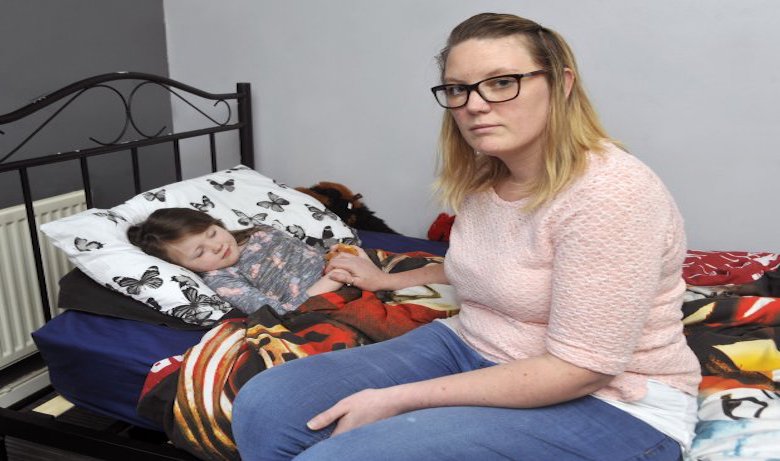A terrified Mother has no choice but to watch her 4-year-old daughter sleep all night long because she could stop breathing at any moment.
Little Phyllisity Ramm suffers from a severe sleep condition which means she stops breathing up to 90 times a night.
She used to have a machine that monitored her sleeping and made an alert sound everytime she stopped breathing.
Now, her frightened Mom has been told the potentially life-saving equipment costs too much money and would no longer be provided.
Instead, Kylie Purkis survives on just an hour’s sleep a night because she has to stay awake watching her daughter incase she needs to administer CPR.
Phyllisity’s sleep apnoea means she often stops breathing during the night and requires life-saving intervention. ‘If she is floppy I will have to fight to bring her round,’ Kylie, 29, said. ‘I have to administer oxygen around three times a week and give her CPR around once every three months. ‘I hate bedtime. It’s terrifying.’
What is central sleep apnoea?
Central sleep apnoea (CSA) is a sleep-related disorder in which the effort to breathe is diminished or absent, typically for 10 to 30 seconds either intermittently or in cycles. It is usually associated with a reduction in blood oxygen saturation. CSA occurs because your brain doesn’t send proper signals to the muscles that control your breathing.
When she was a baby, doctors at Sheffield Children’s Hospital recommended that she be attached to an Oximeter machine every night. The machine measured her heart rate and blood pressure and would alert her Mother when these levels dropped.
The probes – which are used to attach the machine to Phyllisity – ran out last month and since then the family have suffered sleepless nights.
Kylie, from Astley Village in Chorley, Lancashire, said: ‘It is expensive, it costs £800 for the machine but it’s the probes that are the issue really – they cost £398 for 24 single use probes, that is £6,000 a year. ‘I have two other children who need me, I’ve had to give up work. They do not realise what they have done to my family by taking this away.’
The alternative that Kylie has been offered is a neonatal monitor which attaches to a baby’s stomach to measure the rise and fall of the chest. When breathing stops the machine emits a beep.
A spokesperson from Sheffield Children’s NHS Foundation Trust said: ‘Phyllisity has had a number of sleep and respiratory investigations over three days and nights at Sheffield Children’s NHS Foundation Trust. ‘The results confirmed that Phyllisity does not require oxygen overnight and therefore a recommendation based on clinical grounds was made that her overnight monitor could be changed to one that is more suitable for her needs.’
However, Kylie says this is no good for Phyllisity, because she ‘tosses and turns in the night’ so the movement recording is erratic. She is now fundraising to be able to buy her own machine. ‘I refuse to give in for Phyllisity,’ she said. ‘We need this machine to keep Phyllisity alive and I will do whatever it takes to save my daughter.’
